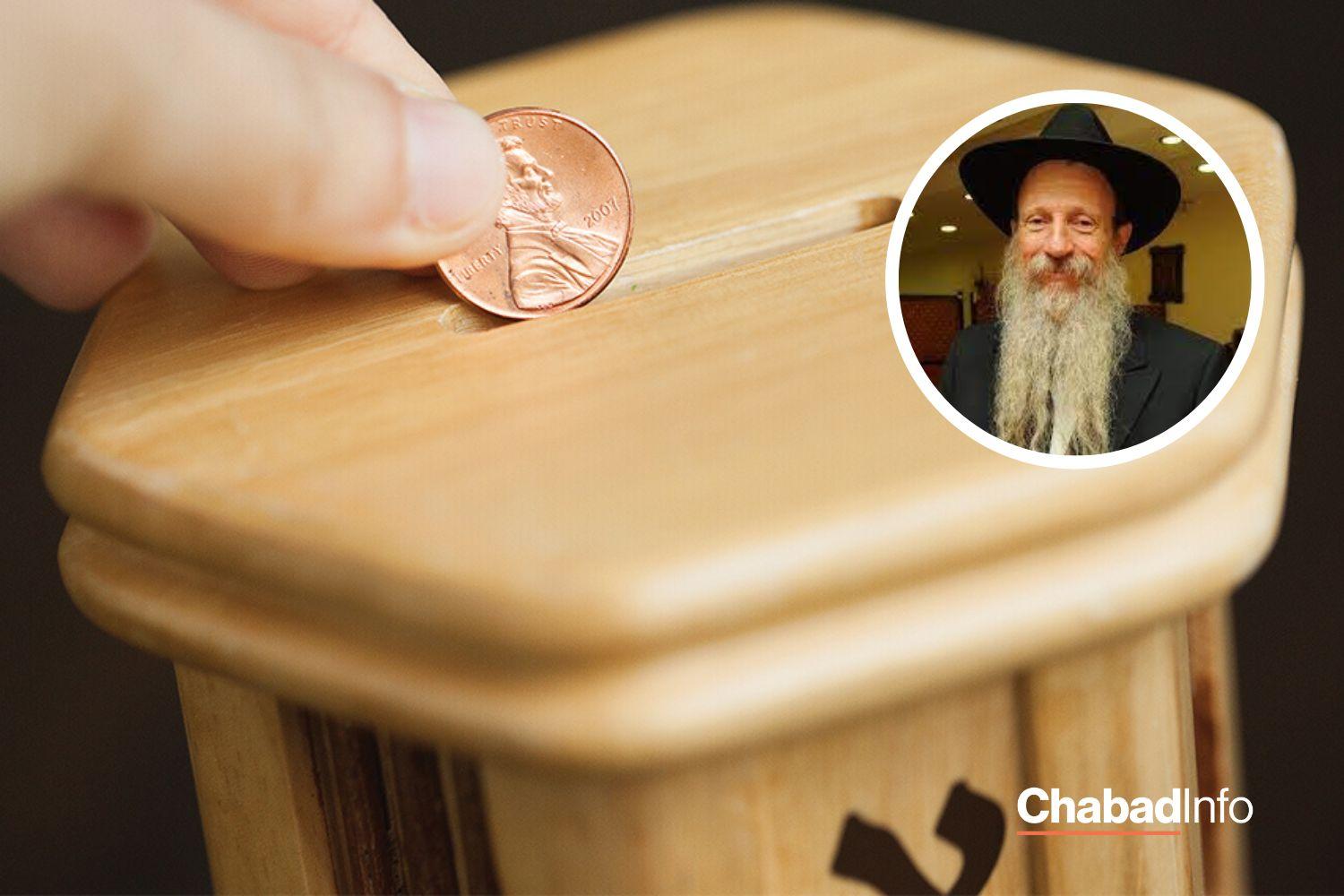Mishpatim: Charity Revealed
This week’s reading contains fifty-three commandments and one is to loan money to the needy (without interest). The Rambam (Matnas Anyim 10:7) teaches that loaning money is the highest form of charity as it maintains the dignity of the receiver… Read the full Dvar Torah by Rabbi Tuvia Bolton • Full Article
By Rabbi Tuvia Bolton
This week’s reading contains fifty-three commandments and one is to loan money to the needy (without interest). (22:24)
The Rambam (Matnas Anyim 10:7) teaches that loaning money is the highest form of charity as it maintains the dignity of the receiver. And the Zohar teaches that all these monetary laws contain the mystical secret of the reincarnation of souls.
This makes sense when we see how money arouses the essence the soul, awakens the deepest emotions, and causes people to risk and even sacrifice their very lives (spiritual as well as physical).
The main purpose of the Torah, is to teach us how to transform this soul arousal into Jewishness. It’s one of the things that Moshiach will accomplish. (See the last chapter in Mishna Torah of the Rambam that the entire world will only be devoted to knowing and serving G-d). But until Moshiach arrives, souls will have to undergo many incarnations until they get their connection to money right.
The illustrative story is told of two souls that floated past each other in heaven. One was on the way “down” to get born in the world, and the other on its way “up” after finishing its earthly stay.
The one descending said. “Hey! Hello there! Tell me, are you just coming from the world?”
“Yes!” said the rising one.
“Could you tell me what is it like? I mean, what is there for a soul to do down there? In heaven it was great! Why am I descending?”
“That’s an easy one!” The ascending soul answered. “Down there, are Commandments! You can choose to do what G-d wants.”
“Ahhh yes!” The descending soul said excitedly. “Right! Up in heaven they talk about them. Even the angels go wild when someone does one. But I’ve never seen one. What are they?”
“What are they!?” exclaimed the rising one as the distance between them widened. “They are physical things like tzizis from wool or tefillin from leather. And you can get them by just giving a few coins called “Money”.”
“Wow! This is really exciting!” yelled the descending soul as the distance between them widened. “Just a few coins! That’s great! I can’t wait!”
“Oh, but just one thing I didn’t tell you”, yelled the ascending soul who in a few seconds would be too far away to be heard, “Until you get those coins … your soul can go out!”
This is the secret of Judaism and especially of the Holy Temple; taking the mundane and making it holy. It is called serving G-d with “All your might” (i.e. all your money. see Rashi Deut. 6:5) as is explained in the book “Tanya” in many places.
And that is the greatness of Charity.
When one gives charity, it is as though he is giving his very life in order to enliven his fellow man. Therefore, it is often considered the most important commandment, and will be one of the main forces that will bring Moshiach.
Here is a Chassidic story to explain.
It was a cold miserable December day when Shmerel the Rich Miser of Breditchev died. He was outstandingly stingy and, although It’s not nice to say, no one regretted his passing, and everyone was glad he died on a day when the weather provided the perfect excuse not to attend his funeral.
So you can imagine how surprised everyone was when the Rabbi of the city, the holy Rabbi Levi Yitzchak of Breditchev announced that he was going to the funeral and wanted everyone else in the town to join him.
They bundled up in their warmest clothes and dutifully complied but as soon as the funeral ended they asked the Rabbi for an explanation. How could such an insensitive miser merit such a grand honor?
“True, Shmerl kept to himself.” The Rabbi answered “But that is certainly no sin. And you should know that his reputation as a miser was undeserved. Perhaps he didn’t advertise his generosity, but in fact, he was a remarkably generous person.”
When the Rabbi saw the incredulous looks on everyone’s faces he continued. “I know this, because on three occasions various people had monetary complaints against him and brought him to trial before me.”
“Complaints? Trial?” murmured the crowd “What is so generous about that?” someone said aloud.
The Rabbi continued, “The first time was about twenty years ago, and the man who brought him was very distraught.
“It seems that a certain businessman lost a leather pouch in the marketplace containing over two thousand golden coins he was going to invest in merchandise. It was a small fortune and most of the money was borrowed, so he was under extreme pressure to find it. At first, he kept it quiet so no one would know what had happened, he was afraid to advertise it. He searched alone feverishly for a half-hour. But when it didn’t turn up, he became desperate, confused, started moaning loudly, fell into a swoon, and passed out unconscious right there in the middle of the market place!
This, of course, attracted much attention. A doctor arrived and announced that the man’s life was in danger, and when he revived him, our hero feebly mumbled “Two thousand guilders…brown leather pouch …. Oy! Oy!” and fainted again.
“Suddenly someone stepped out from the crowd and announced, ‘I found it! Here! Exactly that amount of money a few minutes ago! Here! Look! It wasn’t in a leather pouch but maybe someone stole it and threw the pouch away. Anyway, here it is! I was just on my way to take it to the Rabbi to ask him what to do with it. You’re in luck my friend!” Whereupon he gave the bewildered man the money, and disappeared in the crowd before anyone could even notice who he was.
“The crowd dispersed and went back to business except for one man … the real thief!
“He was holding the stolen money, and when he saw what happened it shook him to the depth of his soul. Here, he was so selfish that he was willing to make others suffer and TAKE their money, while this man was willing to suffer and GIVE money just to help … a complete stranger!
“He began to think deeply until he decided to change his ways. So a few days later he appeared at the door of the “finder” with the money. But he was in for a surprise: ‘Sorry my friend’ was the reply. ‘I gave that money because that is what G-d wants. And if Gd wants…. HE will repay me. I don’t want the money you stole. If you want, give it to charity, not me!’
“The thief had no recourse but to bring him to me for trial and demand that he take the money. But I decided in favor of the defendant; I told the thief to give the money to charity and stop stealing, but the “finder” didn’t have to accept it if he didn’t want to.
“And that “finder” was none other than …. Shmerel the “miser”.
“The second case came a few years later. Someone in Braditchev told his wife that he was going on a business trip for a month. But he really intended to desert her and his children and never return again. He gave her enough money to last her a month and said that Shmerel the Miser owed him a large debt and that when she needed more, she should go to him and he would pay her, which, of course, was a lie.
“A month later when the money ran out and she went to Shmerel’s house at first he didn’t understand what she was talking about. But after a few seconds he figured it out. He told her to enter, gave her a nice sum, apologized for “forgetting” and told her to return whenever she needed more.
“Meanwhile, her wayward husband wandered around for five years, until he managed to get himself into really big trouble. His life was in danger, and he and swore to G-d that if he lived, he would repent. Miraculously G-d saved him. He escaped, repented and even returned home to beg forgiveness. He expected his wife would be angry, that she wouldn’t let him in and demand a divorce. But when he arrived, he was amazed to see that she and his children received him with joy and open arms. “Why, Shmerel paid me the money every month just like you said he would.” She explained. “He must have owed you a fortune!”
“But when the ‘deserter’ went to Shmerel to thank him and offer to pay him back in installments, Shmerel refused. “You don’t owe me anything” He insisted. “I gave the money of my own free will. If you want, take me to court.”
“The case came before me and I decided, as before, that Shmerel had no obligation to accept the money, but the man should give it to charity if he so desired.
“The last case was the simplest. A fellow named Isaac needed to borrow a large sum of money for a business deal but couldn’t obtain it for the obvious reason that he had a bad reputation and no one trusted him. When he had almost lost hope, he remembered that one ‘potential’ loaner sarcastically told him to try Shmerel the miser. So with nothing to lose, he decided to try his luck.
“Shmerel received him cordially, invited him in and asked him to sit down. But when he heard what he wanted and asked for guarantors who could back up the loan, all Isaac could say was, “G-d Almighty is my only guarantor”.
But surprisingly Shmerl took him seriously. He thought for a while, replied that he had the best guarantor possible and gave him the loan.
“The loan was for one year but Isaac didn’t show up on time to pay it back. In fact, he only turned up five years later with the money. But he was amazed when Shmerel refused to accept it! Shmerel claimed that just after the year was up he unexpectedly made an extraordinary profit from one of his investments which he considered to be G-d keeping His end of the deal. “If you want to repay someone,” Shmerl said, “then repay G-d, not me.”
“The man came to court and pressed charges, he demanded that Shmerel just take the money back. But I, as twice before, refused to force Shmerl to accept it.
“So you can see that you were wrong about Shmerl. Money didn’t make him crazy. All he cared about was doing what G-d wants and making people happy and trusted G-d to take care of the rest. All his life he was quiet and kept away from attention, now is the first time that he can’t refuse!”
That is why loaning money to poor people is so important. Because this is exactly what G-d does to us:
G-d creates the entire world (including each of us) constantly so actually we come from ‘nothing’, have nothing of our own and G-d certainly doesn’t owe us anything…. Nevertheless He “loans” us our talents, our senses, and our very being in order that we work and “repay” Him! Even if our only guarantor is ….. G-d Himself.
All this in order that we retain the feeling of self-achievement and dignity.
This is the secret of true “Simcha” (Jewish joy), Like Shmerel the miser; to be happy that we can do the will of G-d and bring blessing to the world.
And that the reason that Charity is so important; it simulates what the world will be like when Moshiach arrives. People will no longer be selfish and concerned with receiving …. but only with doing what G-d wants and GIVING! Making the world into a perfect place.
And we can make it happen.
And not much is missing. We are standing on the merits of thousands of years of Jewish charity and good deeds. Today, by learning the teachings of the Lubavitcher Rebbe (see your local Chabad House for details) it could be that just one more good deed, word or even thought can tip the scales change the entire world and bring …..
Moshiach Now!
And because this Shabbat also ushers in the Joyous month of Adar we wish you all… Moshiach NOW in JOY!
Rabbi Tuvia Bolton
Yeshiva Ohr Tmimim
Kfar Chabad, Israel
23
Join ChabadInfo's News Roundup and alerts for the HOTTEST Chabad news and updates!











































